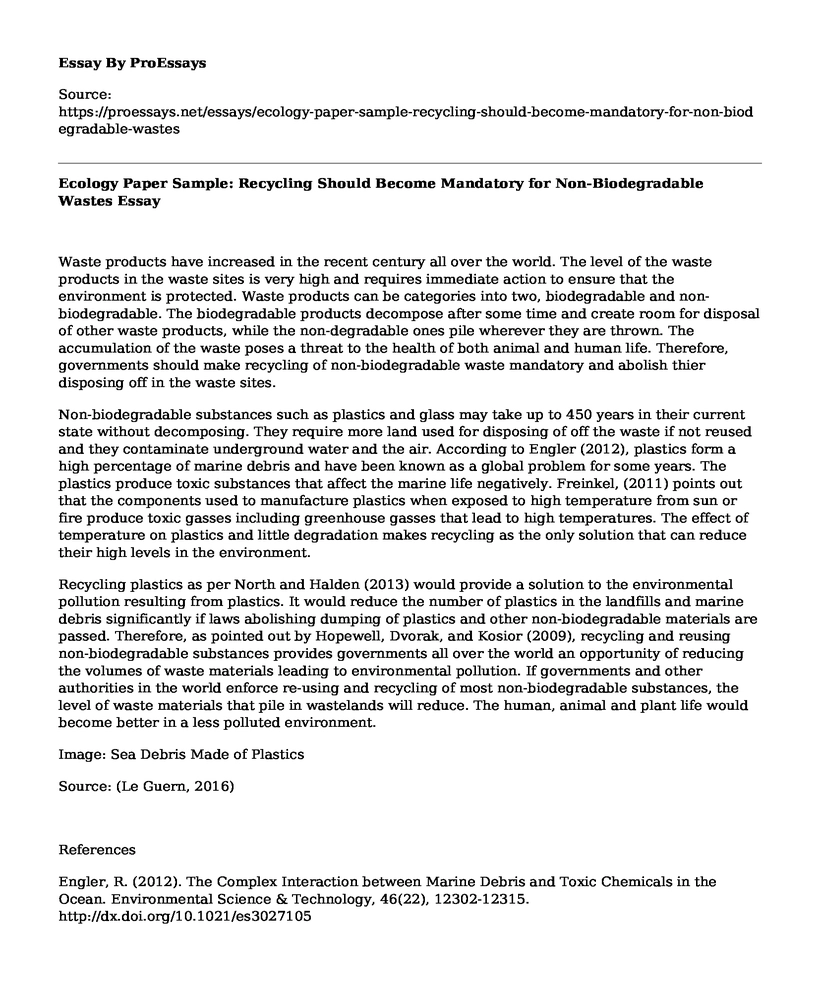Waste products have increased in the recent century all over the world. The level of the waste products in the waste sites is very high and requires immediate action to ensure that the environment is protected. Waste products can be categories into two, biodegradable and non-biodegradable. The biodegradable products decompose after some time and create room for disposal of other waste products, while the non-degradable ones pile wherever they are thrown. The accumulation of the waste poses a threat to the health of both animal and human life. Therefore, governments should make recycling of non-biodegradable waste mandatory and abolish thier disposing off in the waste sites.
Non-biodegradable substances such as plastics and glass may take up to 450 years in their current state without decomposing. They require more land used for disposing of off the waste if not reused and they contaminate underground water and the air. According to Engler (2012), plastics form a high percentage of marine debris and have been known as a global problem for some years. The plastics produce toxic substances that affect the marine life negatively. Freinkel, (2011) points out that the components used to manufacture plastics when exposed to high temperature from sun or fire produce toxic gasses including greenhouse gasses that lead to high temperatures. The effect of temperature on plastics and little degradation makes recycling as the only solution that can reduce their high levels in the environment.
Recycling plastics as per North and Halden (2013) would provide a solution to the environmental pollution resulting from plastics. It would reduce the number of plastics in the landfills and marine debris significantly if laws abolishing dumping of plastics and other non-biodegradable materials are passed. Therefore, as pointed out by Hopewell, Dvorak, and Kosior (2009), recycling and reusing non-biodegradable substances provides governments all over the world an opportunity of reducing the volumes of waste materials leading to environmental pollution. If governments and other authorities in the world enforce re-using and recycling of most non-biodegradable substances, the level of waste materials that pile in wastelands will reduce. The human, animal and plant life would become better in a less polluted environment.
Image: Sea Debris Made of Plastics
Source: (Le Guern, 2016)
References
Engler, R. (2012). The Complex Interaction between Marine Debris and Toxic Chemicals in the Ocean. Environmental Science & Technology, 46(22), 12302-12315. http://dx.doi.org/10.1021/es3027105
Freinkel, S. (2011). Plastic (1st ed.). Boston: Houghton Mifflin Harcourt.
Hopewell, J., Dvorak, R., & Kosior, E. (2009). Plastics recycling: challenges and opportunities. Philosophical Transactions Of The Royal Society B: Biological Sciences, 364(1526), 2115-2126. http://dx.doi.org/10.1098/rstb.2008.0311
Le Guern, C. (2016). Plastic Pollution | Coastal Care. Coastalcare.org. Retrieved 11 December 2016, from http://coastalcare.org/2009/11/plastic-pollution/
North, E. & Halden, R. (2013). Plastics and environmental health: the road ahead. Reviews On Environmental Health, 28(1), 1-8. http://dx.doi.org/10.1515/reveh-2012-0030
Cite this page
Ecology Paper Sample: Recycling Should Become Mandatory for Non-Biodegradable Wastes. (2021, Mar 30). Retrieved from https://proessays.net/essays/ecology-paper-sample-recycling-should-become-mandatory-for-non-biodegradable-wastes
If you are the original author of this essay and no longer wish to have it published on the ProEssays website, please click below to request its removal:
- The Supply and Use of Water in Abu Dhabi Paper Example
- Issues of Air Pollution - Research Proposal
- Essay Sample on Climate Action: The Effect of Agriculture on Climate Change
- Essay Sample on Effects of Fog on Distance and Speed Perception
- Essay Example on Arctic Biota at Risk: Competing Interests vs. Survival
- Essay Sample on Calculating Your Ecological Footprint: How Resource Consumption Impacts Your Score
- Essay Example on Wind Turbines: Safe Renewable Energy for Climate and Human Health







